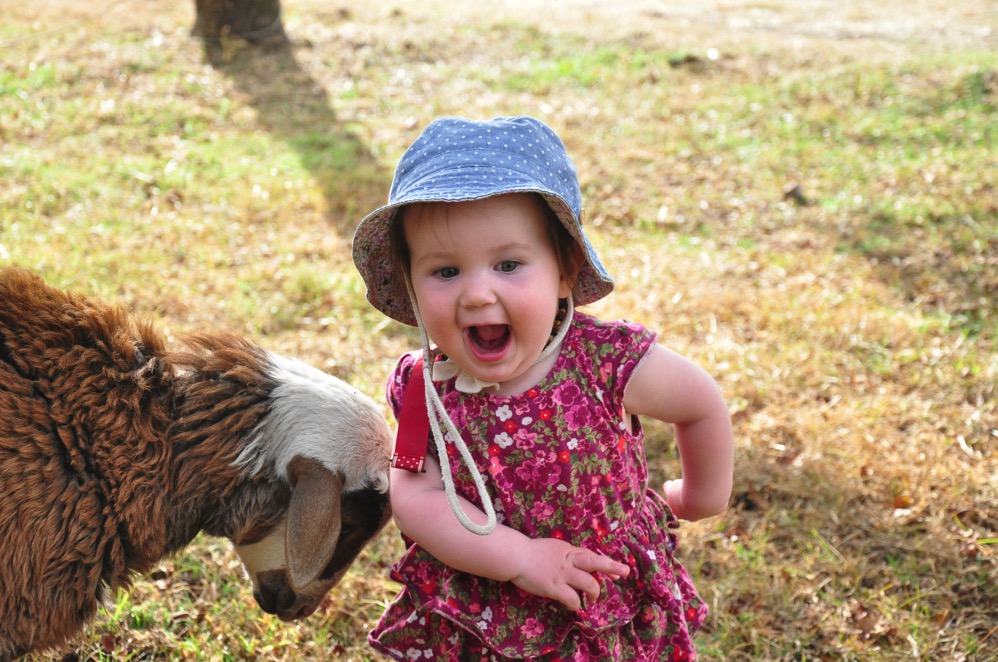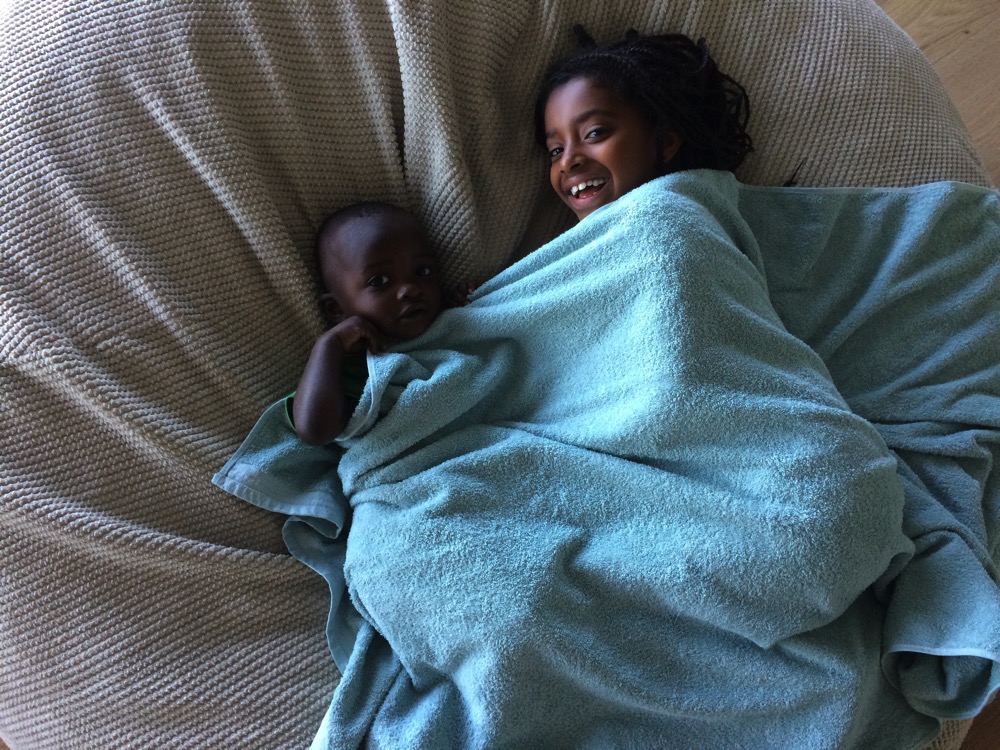Sitting at the breakfast table one morning, we saw a friend enter the gate. Jon went out to talk to them and A reported, “Mom, I think they are going to take one of our sheep”. I dismissed her comment until I looked out the window for myself. A sheep was being led away by a man who was involved in a sheep party that day. I knew there was going to be a sheep butchered. I just didn’t know it was going to be ours, none of us did. Through a miscommunication and misunderstanding of giant proportion, the kids and I didn’t even get a chance to say goodbye.
Benji was going to be lunch and there was nothing we could do about it.

Yes, this Benji. One of the two we raised from lambs. Yes, it was for the purpose of blessing our neighbors with sheep but then…then we named them.

And played with them and dragged them around the yard. Tiger and Miss T love animals though Tiger has learned to keep a distance as he has been knocked down.
We were invited to eat Benji but none of us (besides Jon) could even think about it. Jon did not appreciate the situation but also reminded us we had raised the sheep for “harvesting”. J wrote a letter to her great-grandma later on the same day. My favorite part said, “Today, I am a vegetarian. Benji is being harvested. At least that is what Daddy calls it.”
All of this long intro to start into the content of grief and transition, not in a tone of self-pity or a pit of despair but in a desire to visit lessons learned. My response to Benji’s sudden butcher was out of proportion big. Grief is strange, a small event flaring up memories of other losses. This little heartache, coupled by a friends’ questions on transition had me digging into old lessons learned and collecting dust on my shelf.
Two amazing books for kids living outside of their parents’ passport culture are “Third Culture Kids” and “Swirly”. “Third Culture Kids” is a must-read for anyone working with global nomads. (“Swirly” is a kids’ book that sits on our shelf and we pull it out for many visitors. It’s not only helpful for kids but I believe any family or kids supporting families living abroad. Maybe a book to share in Sunday Schools?)
“Third Culture Kids” deals with how to help kids through transition and grief and I think some of the same principles can be applied to kids (adults too!) everywhere because all kids face transitions and loss. Most of the following information is from either trainings or this book. I spent much of my life trying to skip grief, thinking it bogged me down in discouragement. At MTI, this though was shattered. The following excerpt was pointed to by our trainers. As I reread it this morning, it’s good enough I’ll type it here. With all the recent loss we have experienced in our community, I have not allowed my heart to go down the draining road of grief but I am encouraged to do the hard work.
“Make sadness your ally instead of your enemy. God’s solution for resolving your loss of relationships, dreams, ideals and opportunities is sadness. Rather than something to be avoided, this sadness, or grief, allows you to let go of what you cannot have in order to make room in your heart for what you can have.
Those who don’t feel safe enough to grieve find themselves holding on to lost hopes and relationships. Then it is difficult for them to seek new attachments, since the ghosts of the past still occupy their emotional life. Solomon understood the value of grieving: 'The mind of the wise is in the house of mourning, while the mind of fools is in the house of pleasure.' (Ecl. 7:4)
So it can be good to be sad, but we must not confuse sadness with depression. Depression is the inability to process loss or rage. It’s a heavy paralysis of the soul that won’t allow it to finish resolving a problem. Sadness is actually the antidote to depression.
Depression is static and unmoving, but sadness moves toward resolving loss. That’s why David declared, ‘Weeping may last for the night, but a shout of joy comes in the morning’ (Psalm 30:5).”
(Source: “Hiding From Love” by John Townsend)
The R.A.F.T. Model
When saying goodbyes to people, Pollock and Van Reken in “Third Culture Kids” recommend the model of RAFT.
R: Reconcile the relationship. Make peace and ask forgiveness for any brokenness in the relationship
A: Affirm the relationship, let that person know what they mean to you.
F: Farewell. Make it a good goodbye. Do what is comfortable, hug, kiss, cry if you need to.
T: Think Destination…think future and help your child brainstorm about how life may look in the future. (Example: I know that goodbye was hard to say and you are going to miss your friend. You are probably going to feel sad about this for awhile. I just want you to know I am praying you will make wonderful and deep new friends in our new location.)
We have also found it beneficial to “goodbye” places, especially important if it is somewhere you have lived. At times the mood is silly, sometimes serious, but in stages of many beds and places, we say “goodbye” to anywhere that has become a special memory place for the kids. At a hotel, you will probably find us goodbying the soft beds, the television and the swimming pool.
Listing your Losses:
A friend also encourages writing down a list of things you have lost in the transition and this isn’t just people. In a column beside this, write down all the things “lost” with this.
Example:
Our friends move from our closest neighboring city.
Associated losses:
We will miss their relationships
Our kids lose their kids’ friendship
We don’t have anywhere to park our vehicle anymore when we fly out of the city.
A loss of a doctor who knows us and our kids within a few hours
No more families left besides ours on the North Team
Etc
Naming these losses doesn’t make me wallow. It starts the process of naming the sad and being able to move through it.
If moving into a different culture, the following losses are nearly guaranteed though most of these aren’t reserved just for an overseas move.
-Stable Nest or Home
-Safety
-Competence
-Identity
-Support System
-Quickly and Easily Attained Goals

“We have all experienced loss. Each stage of life brings a new set of changes. And each change brings with it unavoidable losses. The reality of these losses needs to be acknowledged and incorporated int ourselves and the world. This is essential if we’re to recover from loss; it’s the process we go through in a particular recovery journey called grief. Grief is not itself something we recover from.
Grief helps us recover from the many losses we experience. Grief makes it possible for us to face the painful reality of our losses, incorporate those losses into our understanding of ourselves, our world and God himself, and somehow move on.
The purpose of grief is not to help us to forget what we have lost, but to help us grow in understanding, compassion and courage in the midst of our losses.
WE all know that grief is emotionally painful work. Grief allows us to heal and grow, but the cost in emotional energy is often very high. Because of this, we often seek ways to postpone the disciplines of grief. We may tell ourselves to ‘Look on the bright side,’ or to ‘Keep a smile on our face.’ But attempts to avoid the emotionally painful process of grief do not lead to growth.”
(Adapted from “Recovery from Loss” by Dale and Juanita Ryan)
A long post for a dead sheep, huh? ;)
God is in grief. He created the process for our human hearts and minds.